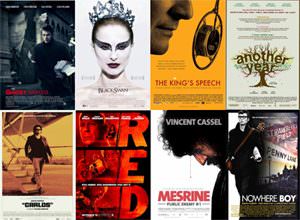Natalie Portman Goes Full Diva in a Flat ‘Vox Lux’
Even Portman’s strong presence, matched by a stellar Jude Law, can’t save actor-turned-filmmaker Brady Corbet from a troubled sophomore effort. Natalie Portman glams it up in this still from "Vox Lux." (IMDb)
Natalie Portman glams it up in this still from "Vox Lux." (IMDb)
A star since the age of 13, Natalie Portman knows a little bit about childhood fame and the pitfalls that have claimed so many young actors on their way to adulthood. With the exception of Jodie Foster, few have treaded that path with the grace and class of Portman, starring in quality popular fare like “Mars Attacks!” and “V for Vendetta” as well as art-house movies like the “The Other Boleyn Girl” and “Black Swan,” for which she won an Oscar. Never one to shy away from a challenge, she commonly defies audience expectations, convincingly playing roles as varied as a stripper in “Closer” and an astronaut in “Annihilation.” Her latest, “Vox Lux,” by neophyte filmmaker Brady Corbet, has her singing and strutting as a pop diva in a way that flies in the face of her Audrey Hepburn-like persona—a challenge she might have been better off avoiding.
Beginning in 1999, when we first meet Celeste (Raffey Cassidy), she is in a Staten Island high school music class. After her life is horrifically interrupted in a way that leaves her on death’s door, a memoriam song composed by Celeste and her sister in the wake of the catastrophe goes viral, presenting an opportunity at stardom that she eagerly pursues. This includes taking on a salty manager (Jude Law) and a steely publicist (Jennifer Ehle), as well as learning slick dance moves for her first music video. When Celeste meets a drug-addled guitarist at a club in L.A., she thinks she might be falling in love. But soon 9/11 happens, prompting narrator Willem Dafoe to hyperbolically inform us that “Celeste’s loss of innocence curiously mirrored that of the nation.”
After about 50 minutes we jump to 2017 to find Celeste, now a famous pop star played by Portman, in Manhattan on the day of a big concert. Over lunch with her estranged teenage daughter, Tony (Sophie Lane Curtis), she sneaks a glass of wine and offers the girl narcotics, then reprimands the restaurant manager for having the temerity to ask for a photo with her. The scene looks as if it could have been filmed on Portman’s first day of shooting, as she uncharacteristically hams it up, initially struggling with a Staten Island accent.
Returning to the hotel, she argues with her long-suffering sister, Eleanor (Stacy Martin), bullying and abusing her, revealing the corrosion of the girl whom Dafoe earlier described as “kind and full of grace.” In short, Celeste has become the brat she never was as a child. In a press conference, she dances around the subject of a mass shooting in Croatia (do they have those there?), in which the gunmen wore masks resembling those worn in one of her music videos.
Later, she argues with her manager before doing drugs and having sex with him. On the way to the concert in Staten Island, she has the van pull over by a wintry beach and, joined by her daughter, drops to her knees in prayer. By the time they arrive at the venue, Celeste is too high to go on, but she does so anyway—and crushes it. The final 15 minutes of the film are taken up with Celeste strutting and singing three songs written for the soundtrack by real-life pop star Sia. Meanwhile, Dafoe informs us that when she was nearly killed all those years ago, Celeste claimed to have made a pact with the devil in exchange for her life.
It wouldn’t be fair to tell viewers not to see this film. Some might like it, and hard-core fans of Portman may love it, but the script is flat, with no themes or ideas behind it other than that tired old chestnut about fame corrupting the innocent. Corbet’s limited experience as a filmmaker results in takes that run too long, matching scenes that do the same.
An established actor from an early age, Corbet counts among his credits Jack Bauer’s girlfriend’s son in the fifth season of the hit TV show “24.” As is often the case with actors who direct, he apparently works well with his cast, particularly Jude Law. Unrecognizable as a grumpy old music-industry hack, Law plays like he’s always on edge and eager for any substance or piece of flesh that might dull that edge. As he’s aged, he’s evolved from an impossibly pretty movie star in titles like “The Talented Mr. Ripley” and the aforementioned “Closer” to a more mundane and relatable presence, actually delivering some of the best work of his career in “Vox Lux.”
Despite the film’s many problems, Portman emerges unblemished. Like the pro she is, no matter how trite the dialogue or how unbelievable a scene might play, as when she denigrates Eleanor, Portman makes it work. While it’s difficult to imagine her as a pop diva in a form-fitting suit (she hasn’t the persona and has not overtly played up her sex appeal), once she takes the stage, all doubts are dispatched.
Still, one has to wonder why Portman might agree to a film like “Vox Lux.” Perhaps she connected on the basis of her own upbringing in the spotlight, or she might have been drawn by the movie’s depiction of mass shootings and the aftermath in the hopes of shedding light on the subject. Maybe Corbet is an old friend, or maybe she just likes helping out new filmmakers, since the movie would likely not have been financed without her. Whatever her reasons, she is due the benefit of the doubt given a career that has suggested largesse to be a stronger motivating factor than self-aggrandizement.
“Vox Lux” won’t help Portman’s career much, but a misstep for the right reasons is not something to deride. Still, to see two seasoned actors like Portman and Law drastically outshining the movie around them is a pity more than a thrill. Maybe next time she should just say no.
Your support matters…Independent journalism is under threat and overshadowed by heavily funded mainstream media.
You can help level the playing field. Become a member.
Your tax-deductible contribution keeps us digging beneath the headlines to give you thought-provoking, investigative reporting and analysis that unearths what's really happening- without compromise.
Give today to support our courageous, independent journalists.





You need to be a supporter to comment.
There are currently no responses to this article.
Be the first to respond.